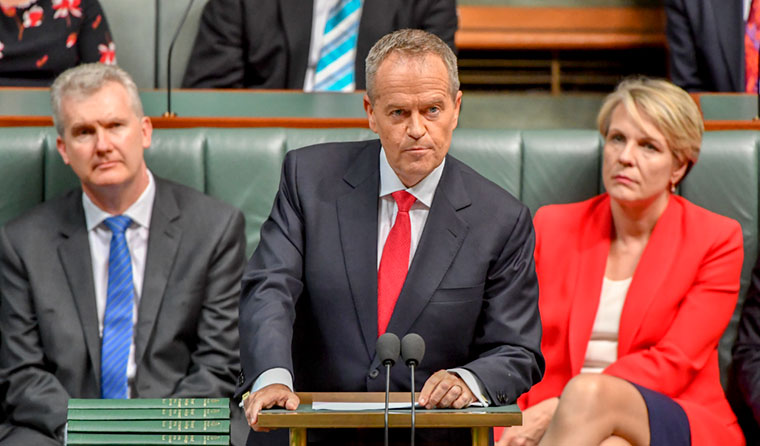News
Lines drawn for election healthcare battle
Labor has accused the Federal Government of ‘giving up’ on healthcare funding following the launch of the Coalition’s long-term national health plan.
 Prime Minister Scott Morrison has said Labor is on a ‘cost merry-go-round’. (Image: Mick Tsikas)
Prime Minister Scott Morrison has said Labor is on a ‘cost merry-go-round’. (Image: Mick Tsikas)
With the Federal Election less than a month away, health has been identified as a major priority for voters and both sides of the aisle have been competing to prove their respective healthcare credentials.
The Government’s plan, launched over the weekend, includes $100 million in newly-announced funding for regional clinical trials centred on life-threatening diseases and conditions, as well as $65 million for a dedicated cystic fibrosis unit at Sydney’s Westmead Hospital.
However, it does not contain any additional funding to match the Opposition’s proposed $2.3 billion Medicare Cancer Plan or $2.8 billion Better Hospitals Fund, which prompted Shadow Minister for Health and Medicare Catherine King to accuse the Government of having ‘no health policy, only cuts’.
‘The Liberals will not invest a single cent more in health during the course of this campaign. They have completely given up,’ Ms King said.
In response, Prime Minister Scott Morrison has said Labor’s plan lacks detail and is missing $6 billion in funding.
‘Bill Shorten is on a cost merry-go-round when it comes to not only these issues, but many others that he won’t come clean on,’ Prime Minister Morrison said.
The Government’s healthcare pitch includes claims that Medicare funding is at ‘record levels’, and the GP bulk-billing rate of 86% is the highest it’s ever been.
It also points to a new $1.6 billion package designed to strengthen primary care, as well as an additional $31 billion for public hospitals from 2020–21 to 2024–25 and a further $6 billion for Medicare.
 Opposition leader Bill Shorten has vowed his party will end the freeze on indexation for 100 general practice MBS items within 50 days of the coming election if elected. (Image: Mick Tsikas)
Opposition leader Bill Shorten has vowed his party will end the freeze on indexation for 100 general practice MBS items within 50 days of the coming election if elected. (Image: Mick Tsikas)
Both parties also have policies in place to end the Medicare freeze, but RACGP President Dr Harry Nespolon has said neither has a plan to repair the damage from years of static rebates, and called for additional funding to accurately represent the cost of providing GP services.
‘Both sides of politics have claimed the win on lifting the Medicare freeze if elected next month, but our patients need to see a real commitment to their care and general practice services,’ Dr Nespolon said.
‘For years, over multiple governments by all sides of politics, patients have been disadvantaged by continued freezes and cuts to Medicare and general practice services. Something must be done to make sure patients don’t delay seeking care and that they are able to access the high-quality healthcare provided by general practice.
‘If the Medicare rebate rose with CPI [consumer price index] since 2005, patients would now be eligible for a rebate of $42 instead of the current $38 for a standard GP consultation.’
Other GP-specific aspects of the Coalition’s plan include $550 million for the Stronger Rural Health Strategy, which in part should fund more than 3000 additional GPs in regional Australia, and $448.5 million to assist with providing care for patients with chronic and complex conditions. More than $62 million will be spent over five years to implement a National Rural Generalist Pathway.
Additionally, a ‘Recognise, Respond, Refer’ pilot program designed to train GPs and staff to recognise and manage family violence will receive a $7.5 million boost and be extended across five Primary Health Network regions, while a further $2.1 million training initiative will be spent on improving the domestic violence response of GPs and primary care workers.
Opposition leader Bill Shorten has vowed his party will end the freeze on indexation for 100 general practice Medicare Benefits Schedule (MBS) items within 50 days of the coming election, should it win, and has promised $115 million to help ‘close the gap’.
The RACGP has been active in the lead up to the election; encouraging GPs to advocate for a greater focus on primary care, while a targeted advertising campaign is calling on politicians to ‘put patients first’.
‘General practice is Australia’s most accessed form of healthcare, with nearly 90% of all Australians visiting their GP each year – yet general practice only receives 7.4% of all government health expenditure,’ Dr Nespolon said at the campaign’s launch.
‘As a profession we are standing up and saying that enough is enough. Patients need to know that because of decisions made by successive governments, more and more Australians cannot afford to see their doctor.
‘Our campaign calls for voters to put pressure on their candidates and ask them to support them and their loved ones get the care they deserve, not just the care they can afford. Make your health the focus of this election.’
In addition to advertising across a number of channels, the RACGP’s election campaign has produced a range of materials for members to use in lobbying their local candidates and politicians.
More information on the campaign can be found on the RACGP website.
Federal Election healthcare funding
newsGP weekly poll
Health practitioners found guilty of sexual misconduct will soon have the finding permanently recorded on their public register record. Do you support this change?